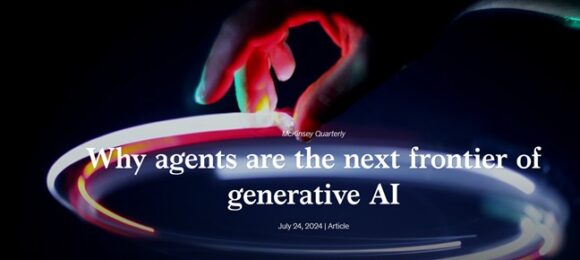Dear Commons Community,
McKinsey & Company had an informative article entitled “Why agents are the next frontier of generative AI?” yesterday that examines the next stage of AI as moving from knowledge tool to action agent. Here is an excerpt.
Over the past couple of years, the world has marveled at the capabilities and possibilities unleashed by generative AI (gen AI). Foundation models such as large language models (LLMs) can perform impressive feats, extracting insights and generating content across numerous mediums, such as text, audio, images, and video. But the next stage of gen AI is likely to be more transformative.
We are beginning an evolution from knowledge-based, gen-AI-powered tools—say, chatbots that answer questions and generate content—to gen AI–enabled “agents” that use foundation models to execute complex, multi-step workflows across a digital world. In short, the technology is moving from thought to action.
Broadly speaking, “agentic” systems refer to digital systems that can independently interact in a dynamic world. While versions of these software systems have existed for years, the natural-language capabilities of gen AI unveil new possibilities, enabling systems that can plan their actions, use online tools to complete those tasks, collaborate with other agents and people, and learn to improve their performance. Gen AI agents eventually could act as skilled virtual coworkers, working with humans in a seamless and natural manner. A virtual assistant, for example, could plan and book a complex personalized travel itinerary, handling logistics across multiple travel platforms. Using everyday language, an engineer could describe a new software feature to a programmer agent, which would then code, test, iterate, and deploy the tool it helped create.
Agentic systems traditionally have been difficult to implement, requiring laborious, rule-based programming or highly specific training of machine-learning models. Gen AI changes that. When agentic systems are built using foundation models (which have been trained on extremely large and varied unstructured data sets) rather than predefined rules, they have the potential to adapt to different scenarios in the same way that LLMs can respond intelligibly to prompts on which they have not been explicitly trained. Furthermore, using natural language rather than programming code, a human user could direct a gen AI–enabled agent system to accomplish a complex workflow. A multi-agent system could then interpret and organize this workflow into actionable tasks, assign work to specialized agents, execute these refined tasks using a digital ecosystem of tools, and collaborate with other agents and humans to iteratively improve the quality of its actions.”
The world of AI will surely move into an agentic stage. Exactly when is hard to say.
The entire article is worth a read!
Tony



